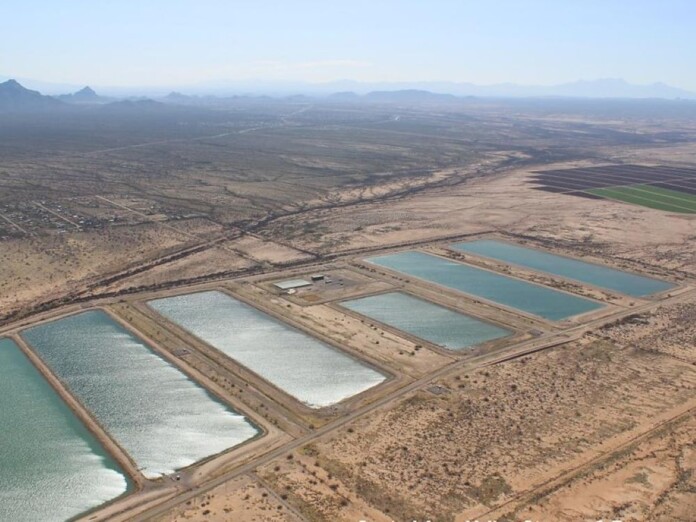
The city of Maricopa has landed a $2.9 million Federal grant for a groundwater recharge project funded through Rep. Greg Stanton’s Arizona-centered $150 million environmental infrastructure authority. The funding came under a Fiscal Year 2022 Work Plan released by the U.S. Army Corps of Engineers in May.
According to a news release from Stanton’s office, “The funds will construct an aquifer recharge facility to allow for class A+ recycled water to be recharged within the city, adding sustainability and resiliency to the existing water supply.”
The grant will be administered in conjunction with Global Water Resources. Global Vice President and General Manager Jon Corwin said preliminary work has already begun.
The funding is part of the larger Bipartisan Infrastructure Law. Since January 2021, 16 water resource projects across the state have been funded through Stanton’s authority, totaling more than $24 million.
“Arizona is already experiencing the harmful effects of climate change,” Stanton said in the news release. “These funds will go a long way to make Arizona communities – and our state as a whole – more resilient and better prepared to protect our water.”
Mayor Nancy Smith said the project allows the city to maximize its resources.
“This $2.9 million will be used for funding the aquifer recharge facility that will capture excess water, allowing Global Water to continue to ensure the aquifer is replenished and the water is not wasted,” Smith said. “As with all communities, taking advantage of all opportunities to preserve and replenish our water is essential to our future.”
City manager Rick Horst expressed gratitude for Stanton’s efforts on an issue as crucial as the city’s water resources.
“We know that creating sustainable solutions that safeguard our valuable water resources is critically important,” Horst said. “We are pleased and grateful that Congressman Stanton is protecting Maricopa’s interests by advocating for our water infrastructure projects. With the rapid growth Maricopa is experiencing, the creation of a new aquifer recharge facility will help support our local water supply needs into the future.”
Corwin said Global has begun preliminary work to identify the best site for the project.
“We are currently doing infiltration tests in some sites to see if they are suitable for a groundwater recharge facility,” Corwin said. “All the sites we’re testing are in Pinal County. We’re looking at one site near our Campus 1 facility in north central Maricopa, next to the Lakes at Rancho El Dorado. We also are testing at our Southwest Plant on Papago Road on the south side of town. The other areas we’re looking at a re farther away from Maricopa.”
Such a project will require construction of a recharge facility. Corwin said Global has already begun “tabletop exercises,” as well as testing to see how water percolates down to the aquifer through various soils and land.
“Ultimately, we will build a constructive recharge facility that will allow water to percolate down to the aquifer,” he said.
The legislation was drafted to support Arizona’s environmental infrastructure authority, which provides grants to small, rural or tribal communities throughout the state to address water infrastructure needs, in the omnibus appropriations bill. The bill was signed into law in March.
Christian Price, who was Mayor of Maricopa at the time the legislation passed and is now President and Chief Executive Officer of the Maricopa Economic Development Alliance, said the project is a win for the city.
“We thank Congressman Stanton for his continued leadership and support for the Environmental Infrastructure program,” Price said. “Because of his assistance, Maricopa will receive $2.9 million for its new aquifer recharge facility. This project will allow excess class A+ recycled water to be recharged within the city. In addition, recharging the aquifer will add to the sustainability and resiliency of our local water supplies as we continue to grow at an exponential rate.
“We are incredibly grateful for Congressman Stanton’s assistance in creating this new program and for his support in helping us secure these important funds.”
Jake Lenderking, Global’s vice president of water resources and legislative affairs, said the project is a great fit within the company’s overall philosophy.
“Water recharge and the use of our recycled water directly are tied directly to our philosophy of total water management,” Lenderking said. “We want to make sure the right uses get the best quality water. We’ve excelled in water conservation over the years and Maricopa has one of lowest gallons per capita usage rates in Arizona. Working toward recharge facility.”
He added that the area around Maricopa is ideal for a recharge project because the aquifer lies close to surface. He said the company will treat recycled water to re-use standards, prior to putting into the recharge facility.
“It’s the same water we distribute around the city in purple pipe (lines dedicated to the reuse and distribution of recycled water). That water is used for non-drinking purposes such as golf course irrigation, commercial and industrial uses, landscaping, parks, and even lakes in residential communities.
“We work closely with both landowners and developers to have an extensive network of purple pipe in place even before roads built to get an efficient use and distribution of our recycled water.”
The size and scope of the facility are still in question since the project is still in its infancy.
“That’s the $10 million question,” Lenderking said. “What the facility looks like will be completely dependent on infiltration rates. If we have a high filtration rate, we can do the same work in less acreage, so we can do it in a smaller facility.”
Lenderking was asked whether the project is more important now that the Department of the Interior has imposed Tier 2 restrictions on Arizona’s allocations of water from the Colorado River.
“This project is very important in today’s day and age, not just because of the Tier 2 restriction on our Colorado River allocations, but all kinds of water scarcity issues out there,” he said. “Fortunately for us, in Maricopa we are not reliant on Colorado River water. It does impact agriculture in the region, though. Agriculture is turning more to groundwater, but we think for the greater community, it’s more important to recharge our aquifer locally so we can replenish our local water supplies. We are working with the City of Maricopa as a private utility because this is a huge benefit to the entire community.”



![Who’s the Best Mom InMaricopa? Nominate now! Marlene Marshall, Christina Olivares, and Meghan Bremer. [Bryan Mordt]](https://www.inmaricopa.com/wp-content/uploads/2023/05/BCM_8465-218x150.jpg)


![Alleged car thief released without charges Phoenix police stop a stolen vehicle on April 20, 2024. [Facebook]](https://www.inmaricopa.com/wp-content/uploads/2024/04/IMG_5040-218x150.jpg)
![Locals find zen with Earth Day drum circle Lizz Fiedorczyk instructs a drum circle at Maricopa Community Center April 22, 2024. [Brian Petersheim Jr.]](https://www.inmaricopa.com/wp-content/uploads/2024/04/PJ_3922-Enhanced-NR-218x150.jpg)







![Who’s the Best Mom InMaricopa? Nominate now! Marlene Marshall, Christina Olivares, and Meghan Bremer. [Bryan Mordt]](https://www.inmaricopa.com/wp-content/uploads/2023/05/BCM_8465-100x70.jpg)
